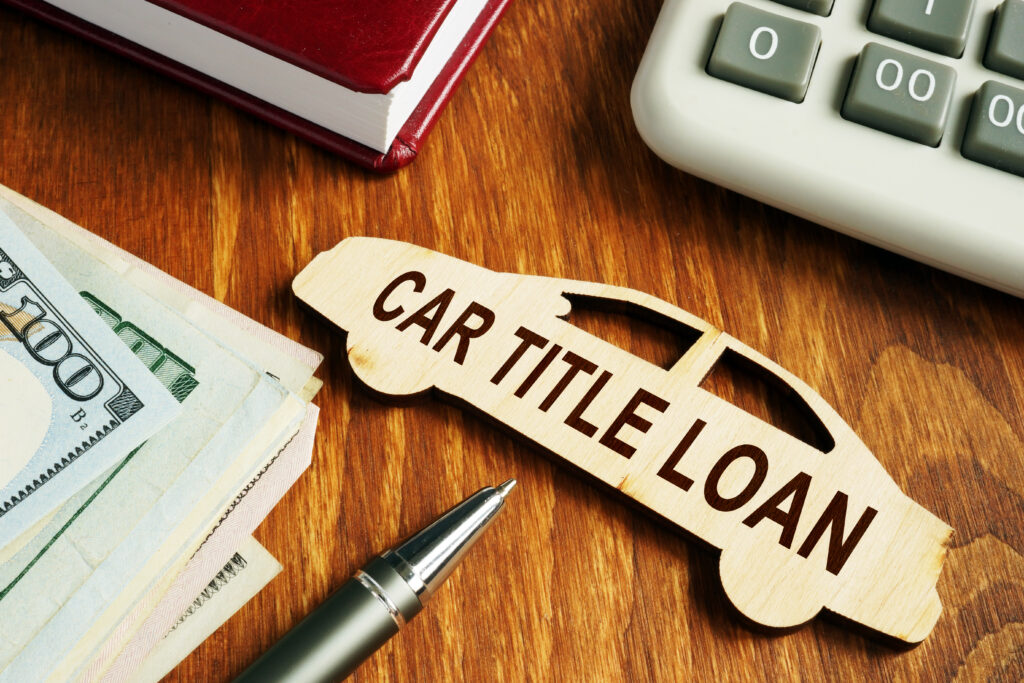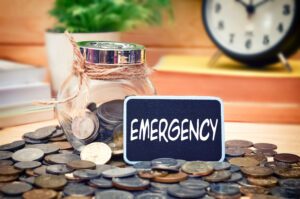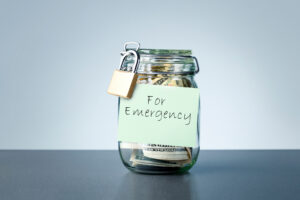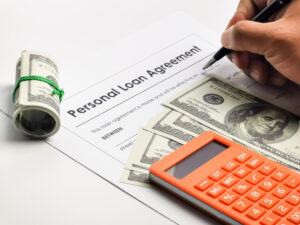
Emergency loans are financial tools designed to provide quick access to funds during urgent situations. There are several types of emergency loans, including payday loans, cash advances, personal loans, and credit card cash advances. Each type has unique terms, interest rates, and repayment schedules. When facing a financial emergency, you should thoroughly research and compare the different types of quick loans. It’s crucial to consider factors such as interest rates, fees, loan amounts, and the speed of funding. Whatever the emergency reasons to borrow money, you can select a loan product or strategy that matches your specific financial needs and repayment capabilities.
How Do Emergency Loans Work?
Let’s summarize how emergency loans work. The process for getting emergency funding varies according to your chosen loan type. You usually start the process by applying for the amount needed to address your emergency. This involves providing personal and financial information, which both storefront and online lenders use to assess your creditworthiness and repayment capacity. Upon loan approval, you and the lender enter into a signed agreement. This contract outlines key details, including loan amount, interest rates, fees, and the repayment schedule. After you sign the deal, the lender disburses the funds quickly, often within one business day, enabling you to address your emergency promptly. You begin repayments according to the agreed schedule by making regular monthly payments until you fully repay the loan. Timely repayment is crucial, as it impacts your credit score and future borrowing capabilities. The entire process, from application to repayment, emphasizes speed and efficiency, catering to your urgent needs.
9 Types of Quick Loans for Emergencies

Quick funding is crucial in emergencies, but it’s essential to recognize that not all solutions fit every situation. Your history and circumstances are vital when reviewing the best emergency loan options, as each type offers distinct terms and conditions. Some of the nine loan types we describe below may offer lower interest rates but require a good credit score. In contrast, others provide immediate funds at a higher cost. It’s essential to carefully evaluate these options, considering factors that include repayment terms, fees, and eligibility criteria. By doing so, you can select an emergency funding solution that best fits your specific needs without busting your budget.
1. Payday Loans
Payday loans let you borrow a small amount (usually less than $1,000) at a high interest rate without a credit check. Typically, you use them to cover unexpected expenses. This type of loan offers easy access and fast funding times, often disbursing the money on the same or the next business day. You can obtain payday loans online or at a storefront lender.
You should use payday loans cautiously since you must repay them on your next pay date (usually in one to four weeks). You risk falling into a cycle of debt if you don’t manage the loan properly, so always repay on time.
PROS:
- Easy to qualify: Minimal credit checks make them accessible to many.
- Fast funding: Funds are often available within the same day.
CONS:
- High interest and fees: Rates are significantly higher than other loan types.
- Short repayment period: Typically requires repayment by the next payday.
2. Home Equity Line of Credit (HELOC)

A home equity line of credit (HELOC) is a form of credit where your home serves as collateral. It allows you to borrow against the equity you’ve built up in your property. HELOCs have low interest rates, as your home secures them. Also, HELOCs offer flexible repayment terms, allowing you to draw funds as needed and repay them immediately or over a period of time. The requirement for equity limits the amount for which you can qualify. Remember: You may lose your home if you default on the loan.
PROS:
- Lower interest rates: As a secured loan, interest rates are generally lower than unsecured loans.
- Flexible repayment terms: Borrowers can choose how and when to repay within the lender’s terms.
CONS:
- Requires equity in your home: Only accessible to homeowners with sufficient home equity.
- Uses home as collateral: Risk of losing your home if unable to repay.
3. Cash Advances on Credit Cards
Cash advances on credit cards allow you to withdraw a portion of your credit limit in cash via an ATM or bank transaction. Cash advances provide easy access to funds. You can quickly obtain money without a formal loan application, making cash advances a convenient option for emergency financial needs.
Credit card cash advances typically incur an excessive cost, including substantial fees and higher interest rates, compared to regular credit card purchases. There is no grace period for cash e advances, meaning interest begins accruing immediately. Interest charges can get expensive, especially if you don’t repay the advance quickly.
PROS:
- Funds are easily accessible: No need for a separate loan application
- Same-day funding: Immediate availability of funds for urgent needs
CONS:
- Excessive cost of borrowing: Elevated fees and interest rates compared to standard credit card use
- No grace period: Interest starts accruing immediately, increasing the overall cost
4. Title Loans

Title loans are a type of secured loan where you use your vehicle title as collateral. This type of emergency loan provides quick funding (often on the same day) for small to moderate amounts and has a short repayment period. Most lenders do not require a credit check, making title loans available even if you have bad credit.
Title loans charge high interest rates, possibly saddling you with a substantial financial burden. Furthermore, they are risky because your vehicle is collateral. If you miss a payment, the lender can seize your vehicle and create great inconvenience, especially if you rely on your car for transportation.
PROS:
- Quick funding: Often provides same-day access to cash
- Some lenders do not require a credit check: Accessible to those with poor credit
CONS
- High interest rates: Can be considerably more expensive than other loan types
- Uses your car as collateral: Risk of losing your vehicle in case of default
5. Loans from Friends and Family
Loans from friends and family involve borrowing money from personal connections rather than financial institutions. No lengthy application processes or approvals are necessary. Additionally, these loans often come with little to no interest. There generally are low-risk types of loans, as friends and family will likely be flexible about repayment if you encounter financial difficulties.
Be careful: These financial transactions can soil relationships, particularly if you don’t repay as planned. Furthermore, defaulting on your loan can lead to feelings of betrayal and mistrust among those close to you.
PROS:
- Potentially rapid funding: Immediate access due to personal relationships
- Little to no interest: More affordable as it often lacks formal interest charges
- Less risk: More flexible repayment terms based on personal understanding
CONS:
- Can cause tension within relationships: Financial issues may strain personal bonds
- Defaulting can harm more than yourself: Non-repayment affects personal relationships and trust
6. Personal Loans

Personal loans are unsecured loans provided by banks, credit unions, or online lenders, offering a lump sum of cash you repay in fixed monthly installments over a set period. You can get quick access to money, making it suitable for emergency expenses. Personal loans typically do not require collateral, meaning you don’t risk losing your assets if you default.
Personal loans have some disadvantages, especially if you have a low credit score. You may face steep interest rates, making the loan more expensive over time. Additionally, personal loans often have origination fees for processing the loan.
PROS:
- Quick access to cash: Funds are usually available within a few days
- Typically does not require collateral: No risk to personal assets
CONS:
- Steep interest for subprime borrowers: Higher costs for those with lower credit scores
- Loan origination fees: Additional charges that increase the total cost of borrowing
7. Payment Plans
Payment plans are arrangements where you agree to repay a debt in smaller, more manageable installments over a specified period. You can use these plans for larger purchases or services and tailor them to your financial situation. The smaller monthly payments make it easier to manage cash flow and budgeting. Some payment plans are interest-free, particularly in promotional offers or specific sectors such as healthcare or education. They sometimes come with high interest rates, especially if you have an imperfect credit history or the plan has a long term. Additionally, these plans often have less flexible repayment terms. Failing to repay on schedule can trigger penalties or additional fees.
PROS:
- Smaller monthly payments: Easier budget management and cash flow
- Some are interest-free: Cost-effective for short-term borrowing
CONS:
- Potentially high interest: Can be expensive over time
- Less flexible repayment terms: Strict adherence to the schedule is a requirement
8. Pawn Loans

Pawn loans involve borrowing money against the value of a personal item that acts as collateral. The pawnbroker assesses your item’s value and offers a loan based on a percentage of that value. You receive cash immediately upon agreeing to the loan terms. Additionally, pawn loans do not impact your credit score, as no credit check is necessary. Typically, you receive less than the actual value of the item you are pawning. Also, the loan uses a personal item as collateral, posing a risk of losing your property permanently to the pawnbroker.
PROS:
- Instant funding: Immediate cash upon agreement
- Does not impact your credit score: Suitable for those with poor credit
CONS:
- Often, you lose value on the item you are pawning: You receive less than the item’s total worth
- Uses a personal item as collateral: Risk of losing your property if you don’t repay the loan
9. Emergency Loans
Emergency loans are financial solutions for urgent money needs, such as unexpected medical bills, home repairs, or sudden expenses. They are quick funding, allowing borrowers to access funds swiftly. These loans’ application and approval process is typically straightforward, with minimal documentation and eligibility requirements. For borrowers who repay their loans on time, these types of loans can also help build good credit, enhancing their overall financial profile.
PROS:
- Quick funding: Access to funds is often fast
- Easy application and approval process: Minimal documentation required
- Helps build good credit: Timely repayment can enhance credit scores
CONS:
- Smaller loan amounts: May not be sufficient for larger financial requirements.
- Higher interest rates: Often more expensive due to the urgency of funding
Be Prepared For Your Next Emergency With Wise Loan

Wise Loan offers a proactive approach to managing emergency financial situations through its accessible and convenient emergency loan services. The primary advantage of Wise Loan lies in its readiness to provide funds when unforeseen circumstances arise, be it medical emergencies or the death of a family member, unexpected home repairs, or any urgent financial need. Here’s how Wise Loan prepares you for your next emergency loan and why it’s a smart choice:
- Quick access to funds: Wise Loan emphasizes speed in processing loan applications. This rapid turnaround time ensures you have the necessary funds available almost immediately, which is crucial during emergencies.
- Flexible repayment options: Understanding that financial situations vary, Wise Loan offers various repayment plans. This flexibility allows you to choose a repayment schedule that aligns with your financial capacity, reducing the stress of immediate repayment.
- Transparent terms: With clear loan terms and conditions, Wise Loan eliminates the surprises often associated with loan agreements. This transparency ensures you understand the repayment terms, interest rates, and any fees involved.
- Building credit history: Timely repayments of your Wise Loan can positively impact your credit score. Discipline is particularly beneficial for future financial endeavors, such as applying for mortgages or larger loans.
- Customer Support: Wise Loan provides robust customer support. It promptly addresses any queries or concerns you might have before, during, or after obtaining a loan.
In summary, Wise Loan provides quick access to funds, flexible repayment options, transparent terms, potential to build a credit history, and strong customer support making it an ideal choice for preparing for and managing emergency loans. This combination of features helps in immediate financial crises and contributes to your long-term financial health. If you are suddenly facing an emergency, then don’t hesitate. Apply now for a quick cash loan from Wise Loan and receive friendly, prompt service, regardless of your credit score.
The recommendations contained in this article are designed for informational purposes only. Essential Lending DBA Wise Loan does not guarantee the accuracy of the information provided in this article; is not responsible for any errors, omissions, or misrepresentations; and is not responsible for the consequences of any decisions or actions taken as a result of the information provided above.











